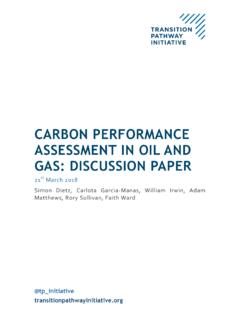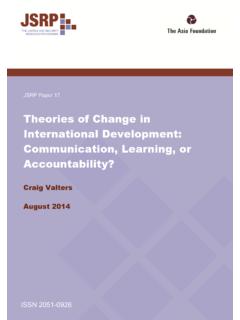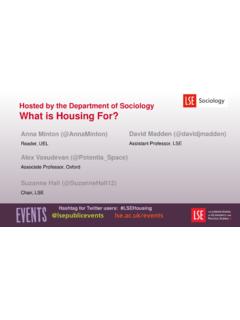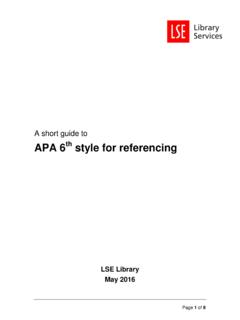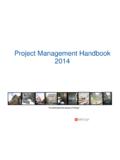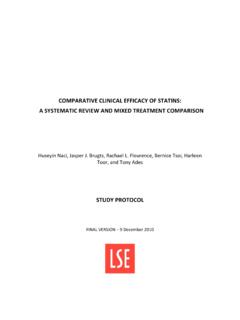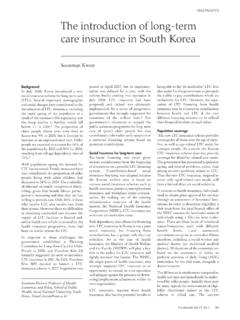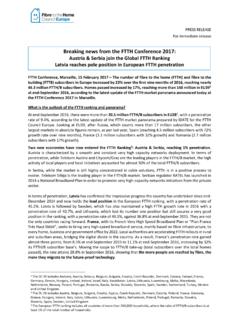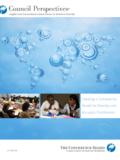Transcription of Measuring Geopolitical Risk - London School of Economics
1 Measuring Geopolitical Risk Dario Caldara Matteo Iacoviello November 9, 2017 AbstractWe present a monthly index of Geopolitical risk (GPR index) based on a tally of newspaperstories that contain terms related to Geopolitical tensions, and examine its evolution and effectssince 1985. The GPR index spikes around the Gulf War, after 9/11, during the 2003 Iraq invasion,during the 2014 Russia-Ukraine crisis, and after the Paris terrorist attacks. High Geopolitical riskleads to a decline in real activity, to lower stock returns, and to movements in capital flows awayfrom emerging economies and towards advanced economies. When we decompose the index intoa threats and an acts component, the adverse effects of Geopolitical risk are mostly driven by thethreat of adverse Geopolitical events.
2 Extending our index back to 1900, Geopolitical risk rosedramatically during the two world wars, was elevated in the early 1980s, and has drifted upwardssince the beginning of the 21st version We thank Alessandra Bonfiglioli, Nick Bloom, Ricardo Correa, Nathan Converse, Chris Erceg, Bo Sun and seminarparticipants at the Federal Reserve Board, the Stanford Institute for Theoretical Economics , the Chengdu InternationalMacro-Finance Conference, the CEF Conference in New York, the Central Bank of Chile, Pontificia Universidad Catolicade Chile, Bank of Italy, University of Cambridge, Bocconi University, and DIW Berlin. Joshua Herman, Lucas Husted,Andrew Kane, and Aaron Markiewitz provided outstanding research assistance.
3 All errors and omissions are our ownresponsibility. The views expressed in this paper are solely the responsibility of the authors and should not be interpretedas reflecting the views of the Board of Governors of the Federal Reserve System or of anyone else associated with theFederal Reserve System. Federal Reserve Board of Governors. Email: Federal Reserve Board of Governors. Email: IntroductionEntrepreneurs, market participants and central banks officials view Geopolitical risks as key determi-nants of investment decisions. The financial press routinely lists Geopolitical risks as important factorsfor stock returns and stock market volatility.
4 In a Gallup 2017 survey of more than 1,000 investors,75 percent of respondents were very or somewhat worried about the economic impact of the variousmilitary and diplomatic conflicts happening around the world, ranking Geopolitical risk ahead of po-litical and economic (2016) includes Geopolitical risk together with economicand policy uncertainty among an uncertainty trinity that could have significant adverse economiceffects. More recently, the European Central Bank in its April 2017 economic Bulletin and the In-ternational Monetary Fund in the October 2017 WEO list Geopolitical uncertainties among one ofthe most salient risks to the economic , the importance of Geopolitical risks in shaping the macroeconomic and financial cycleshas not been the subject of systematic empirical analysis.
5 The main limitation has been the lack ofan indicator of Geopolitical risk that is consistent over time, that can be used to rank geopoliticalevents over history, and that measures in real time the public perception of these events and theassociated risks . This is the perspective we adopt here. Using newspaper records, we construct amonthly index of Geopolitical risk (GPR), and examine its evolution and determinants since 1985. Wethen study the economic effects of Geopolitical risks . When we do so, we find that higher geopoliticalrisk depresses economic activity, lowers stock return, and leads to movements in capital from emergingtowards advanced construction of the GPR index involves three main steps: definition, measurement, and the definition step, we follow one common usage of the term geopolitics, and refer to it as the practiceof states and organizations to control and compete for territory.
6 In particular, we want to identifygeopolitical events in which power struggles over territories cannot be resolved peacefully. Accordingly,we define Geopolitical risk as the risk associated with wars, terrorist acts, and tensions between statesthat affect the normal and peaceful course of international relations. Geopolitical risk captures boththe risk that these events materialize, or the new risks associated with an escalation of existing the measurement step, we draw on the methodology pioneered by Saiz and Simonsohn (2013)and Baker, Bloom, and Davis (2016), and construct the GPR index with an algorithm that countsthe frequency of articles related to Geopolitical risks in leading international newspapers.
7 We plot theresulting benchmark index in Figure 1. The three largest spikes are recorded during the Gulf War, after1 index is available , and during the 2003 invasion of recently, the index spikes during the Ukraine/Russiacrisis and after the Paris terrorist attacks. We also construct an historical version of the index datingback to 1899 and plotted in Figure 3 , which reaches its highest values at the beginning of the twoworld wars, as well as at the onset of the involvement in the audit step, we assess whether the GPR index is an accurate measure of underlying geopoliticalrisks. First, we develop a formal audit process based on a human reading of more than 10,000 newspaperarticles.
8 To quantify type I and type II errors, we audit both articles that comprise the GPR index, andarticles that we sample from a broader set likely mentioning Geopolitical events. The audit of a broad setof articles allows us to construct a human-generated GPR index, which correlates remarkably well withthe benchmark index. The audit also provides an important input to refine the selection of the searchterms used by our algorithm. Second, we compare our index to various metrics of wars and terrorismintensity, which can be interpreted as alternative proxies for Geopolitical risks . Third, we compare theGPR index to popular measures of economic policy uncertainty and financial volatility.
9 Finally, weshow that potential media bias in the coverage of Geopolitical events is not a driver of fluctuations inour then turn our analysis to the role that Geopolitical risks play for the macroeconomy. Using astructural VAR estimated on US data, we find that an exogenous increase in Geopolitical risk inducespersistent declines in industrial production, employment, and international trade, and that economicpolicy uncertainty and consumer confidence both enhance the transmission of the Geopolitical riskshock. We also document that stock returns experience a significant but short-lived drop followinghigher Geopolitical risk.
10 The stock market response varies substantially across industries, with thedefense sector experiencing positive excess returns, and with sectors exposed to the broader economy for instance steel works and mining experiencing negative important question is whether the economic effects of higher Geopolitical risk are driven by therealization of adverse Geopolitical events that is, by first moment shocks as opposed to increases inuncertainty that happen regardless of actual adverse events. To answer this question, we constructtwo sub-indexes that together with some exclusion restrictions discussed in the paper allow us toseparate shocks to Geopolitical acts from shocks to Geopolitical threats.

